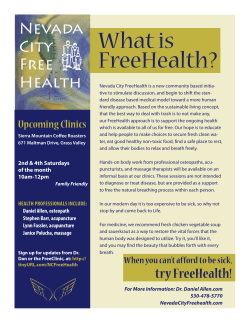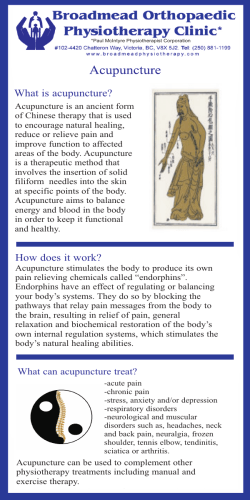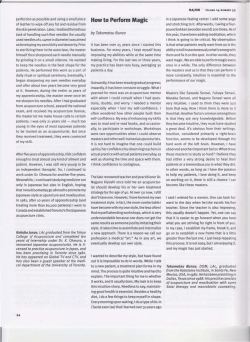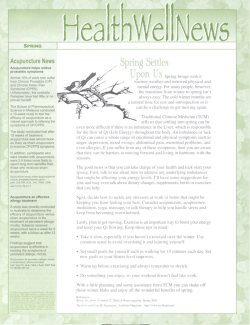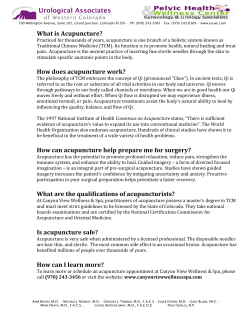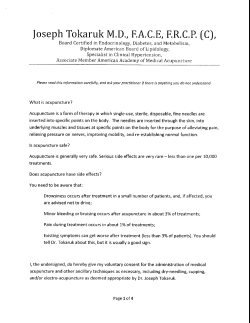
Not a Miracle From Coma to Consciousness: A Discussion on Traditional
Special Report From Coma to Consciousness: Not a Miracle A Discussion on Traditional Chinese Medicine for Brain Injury Narrated by Dr. Yu-ning Lin, Traditional Chinese Department, Tzu Chi General Hospital Coma: Allowing the Body to Focus on Healing “Actually, a ‘coma’ is the body cutting off all links to the outside, and focusing on the work of healing,” said Traditional Chinese Medicine (TCM) physician Dr. Yuning Lin. During the time Rey-jen Cheng was comatose, he responded to acupuncture treatments, so it was added to his treatment plan in conjunction with the work of the Neurology department at Tzu Chi Hospital A-Ren anticipates his treatment from Dr. Lin, after which he feels extremely comfortable. 50 Medicine With Humanity Vol. 9 May 2008 in Hualien, Taiwan. The duration of the coma is often dependent on the rate of healing of the body and the degree to which the body is injured. Acupuncture is to use needles to adjust the functions of the brain, to accelerate the repair of the nerves, which helps the patient in a quicker recovery. The Use of Needles in the Head and Body From a TCM point of view, strokes, cerebral embolisms, cerebral hemorrhages, and brain injuries and diseases in general can all be treated with the use of acupuncture. Recent literature has revealed that the earlier acupuncture treatment is used with appropriate procedure, the better the results and the lower the rates of causing disability to the patients. Generally, acupuncture treatment combines both scalp and body pressure points. The scalp pressure points use the meridian lines of the body as base. Coupled with The Miracle of a Coma Recovery modern imaging techniques of the cerebral cortex, benign stimuli can bring about the ‘ awakening’ of the brain, to promote brain function restoration. In addition, some body acupuncture can play two roles: the first being through the spinal cord, exciting the cells of the paralyzed muscle to prevent atrophy; secondly, repeated stimulus near the peripheral receptors can stimulate nerve cells in unaffected areas, incessantly sending the stimulus brought forth by the needle point. This signal is then transmitted to the central nervous system, exciting the brain’s higher centers, leading to the repair of neurons. This allows the unaffected brain tissues to have a compensatory effect on the injured brain tissues by increasing cerebral blood flow and establishment of collateral circulation. Dr. Lin pointed out that the function of acupuncture lies mainly in increasing muscle strength, easing tension and stiffness, and reducing abnormal reflexes. Effective Treatment Spans Rehabilitation Process From coma to consciousness, acupuncture was an important aspect in , A-Ren s treatment. From atrophy of both legs to walking on his own, and from the inability to speak to talking profusely with great logic, A-Ren made great progress in the strength of his hands and feet, coordination, and cognition. According to his experience of consulting stroke patients for years, Dr. Lin said that the majority of patients showed improvement in their condition in the absence of medication after being in the hospital for six days with oncedaily acupuncture, 20 minutes per session. This, along with scalp and body electro, acupuncture, greatly helped patients conditions improve. This often leads western physicians to conclude that the patients had improved much more than they had expected, and in many cases, surpassed their expectations. However, this is not a miracle, but rather, the results produced by acupuncture treatment. An experiment was performed outside of Taiwan, with a group of patients undergoing acupuncture treatment and a control group. After ten weeks of treatment, the stroke patients who had undergone acupuncture treatment had a faster rate of recovery in the limbs. The level of recovery was also higher in the experimental group. Recovery was determined by balance, mobility, daily activities, quality of life, and days hospitalized. In addition, those who had received acupuncture treatment saved on average $26,000 USD in costs associated with hospitalization. Therefore, due to clinical efficacy and academic support, acupuncture treatment for stroke patients should be promoted. Dr. Lin stressed again that A-Ren’s miraculous recovery was not only because of the cooperation between western and eastern medicine, but that the persistence of his mother was the greatest catalyst in his road to recovery. Medicine With Humanity Vol. 9 May 2008 51
© Copyright 2026
